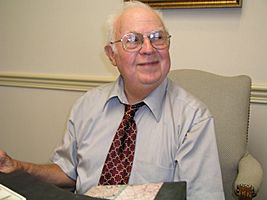Donald Triplett facts for kids
Quick facts for kids
Donald Triplett
|
|
|---|---|

Triplett in 2016
|
|
| Born |
Donald Gray Triplett
September 8, 1933 Forest, Mississippi, U.S.
|
| Died | June 15, 2023 (aged 89) Forest, Mississippi, U.S.
|
| Known for | First person to be diagnosed as autistic |
Donald Gray Triplett (born September 8, 1933 – died June 15, 2023) was an American man. He is famous for being the very first person to be diagnosed with autism. A doctor named Leo Kanner diagnosed him. Donald was even called "Case 1" because he was the first. He was also known for his special "savant" abilities. For example, he could name musical notes just by hearing them. He was also very good at doing quick math problems in his head.
Contents
Donald Triplett's Early Life
Donald Triplett was born on September 8, 1933. His parents were Beamon and Mary Triplett. They lived in Forest, Mississippi. When Donald was very young, he was a quiet child. He didn't always respond to his parents' voices or actions. His way of speaking was also a bit unusual. He didn't play with other kids and seemed distant.
When he was three years old, Donald went to a special care center. But his parents brought him home one year later. His father, Beamon, said Donald was shy but loved patterns. He was interested in numbers, notes, letters, and pictures of U.S. presidents. His father remembered that at age one, Donald could hum and sing many songs perfectly.
Donald's parents found it hard to get him to eat. He didn't seem interested in candy or ice cream like other children. By age two, he could say the 23rd Psalm from the Bible. He also memorized many questions and answers from a Presbyterian church book. That Christmas, he sang a whole song perfectly. He had only heard it once before.
Donald also liked making musical chords. He was very interested in rhymes. When asked questions, he often answered with just "yes" or "no". Around this age, he became very interested in spinning things. He would spin blocks, pans, and other round objects. He didn't like tricycles or swings. He wasn't interested in slides at first. But he started playing on them when he was alone.
He often repeated words or phrases he heard, which is called echolalia. He also had trouble using words like "you" and "I" correctly. He might say "you" when he meant "I". When he entered a room, he would go straight to the toys. He often ignored everyone else, even other children. His mother found it hard to get him to look at her.
In October 1938, the Tripletts visited the Johns Hopkins Children's Center. They met with Dr. Leo Kanner. Donald was eventually diagnosed with autism there. Donald visited several times. During one visit, he didn't even look at the three doctors. Instead, he went to the desk to touch papers and books. Dr. Kanner asked him questions to see his "obsessive nature." He also asked him subtraction questions. Donald strangely replied, "I'll draw a hexagon."
When Donald returned home, his behavior seemed to get better. He learned to play simple songs on the piano. He focused better and seemed more aware of his surroundings. However, he still had autistic meltdowns. These were sometimes called "temper tantrums" back then. He also did some unusual things. He would stand on tables, put food in his hair, chew paper, and put house keys in the drain. He learned fifteen words from an encyclopedia. He would repeat them over and over without using them in a sentence. He still didn't look at people when talking. He also didn't use hand gestures. He only spoke when he needed something. Once he got what he needed, his interest would disappear. He became interested in sorting films and Time magazines by date. He didn't care much about what was inside them.
Donald Triplett's Education and Adult Life
Donald Triplett's diagnosis helped start the long history of understanding autism. This history involved many different ideas among experts.
But Donald and his family stayed out of these big discussions. He went to his local high school. His teachers and classmates were very kind and accepting. In 1958, he earned a college degree in French from Millsaps College. After college, he went back to his hometown. It was a very supportive place. He worked for 65 years at a local bank. His father partly owned this bank.
Donald enjoyed playing golf every day. He learned how to drive a car when he was in his late 20s. He also traveled around the world in his free time.
Donald Triplett's Legacy
Writers John Donvan and Caren Zucker interviewed Donald Triplett. They wrote about his life story in an article called "Autism's First Child." This article was in The Atlantic magazine. Later, he was featured in their book, In a Different Key. This book was even made into a documentary film for PBS. Donald's family members say that his life story "offers hope to parents."
Donald Triplett's Death
Donald Triplett passed away from cancer at home on June 15, 2023. He was 89 years old. He was known as the longest-living person with an autism diagnosis.
Images for kids
See also
 In Spanish: Donald Triplett para niños
In Spanish: Donald Triplett para niños
 | Leon Lynch |
 | Milton P. Webster |
 | Ferdinand Smith |


